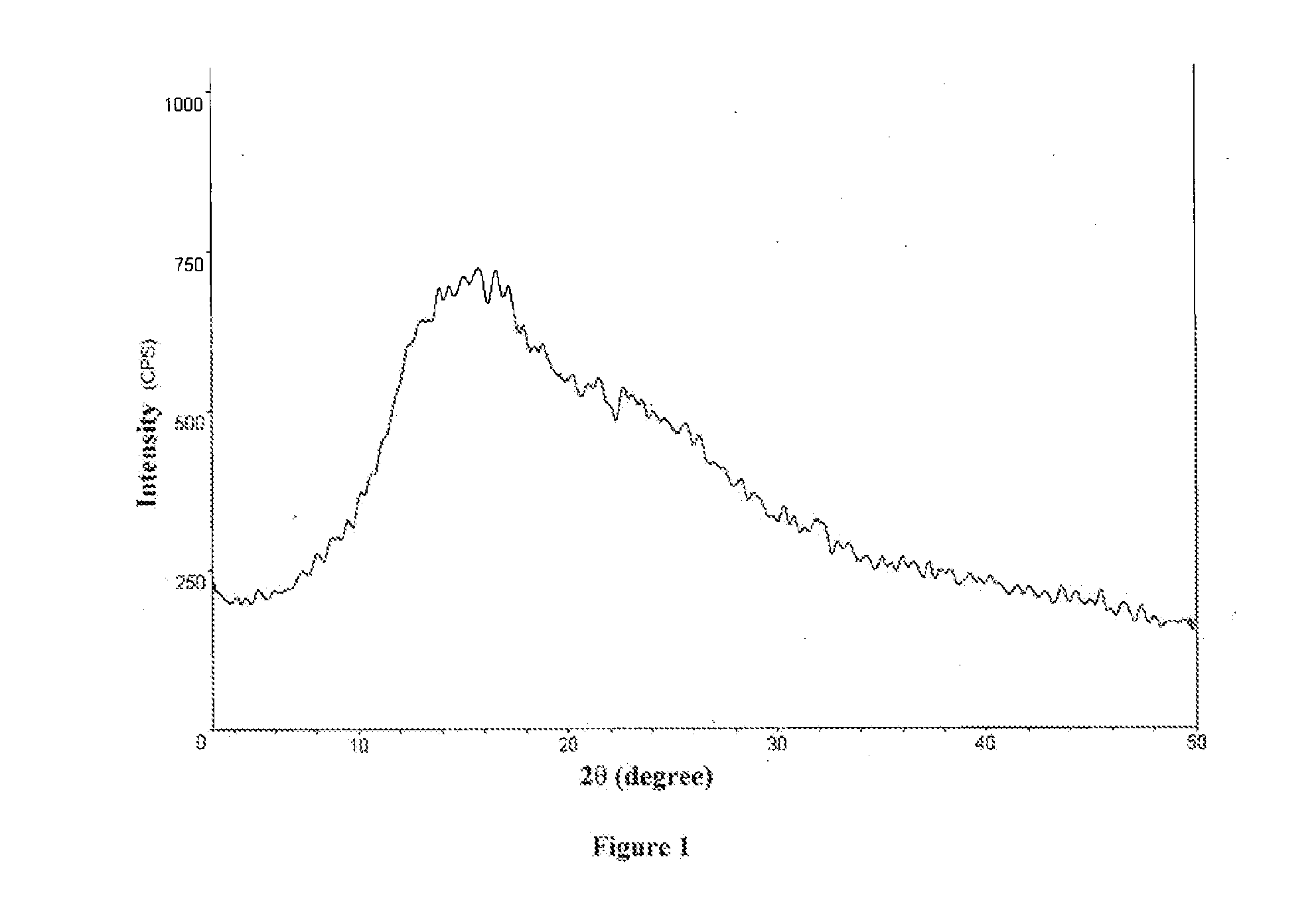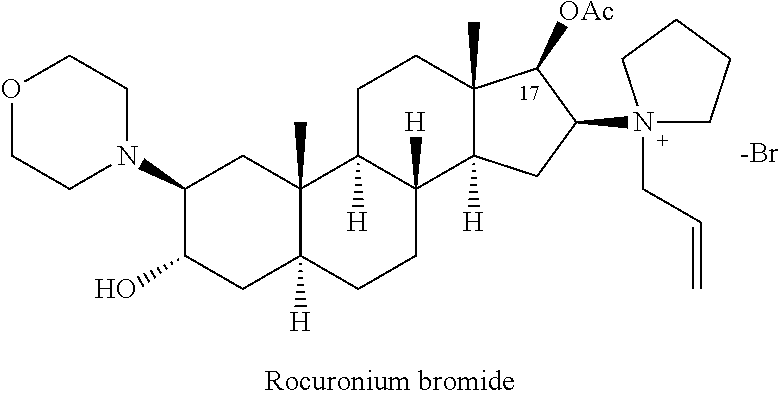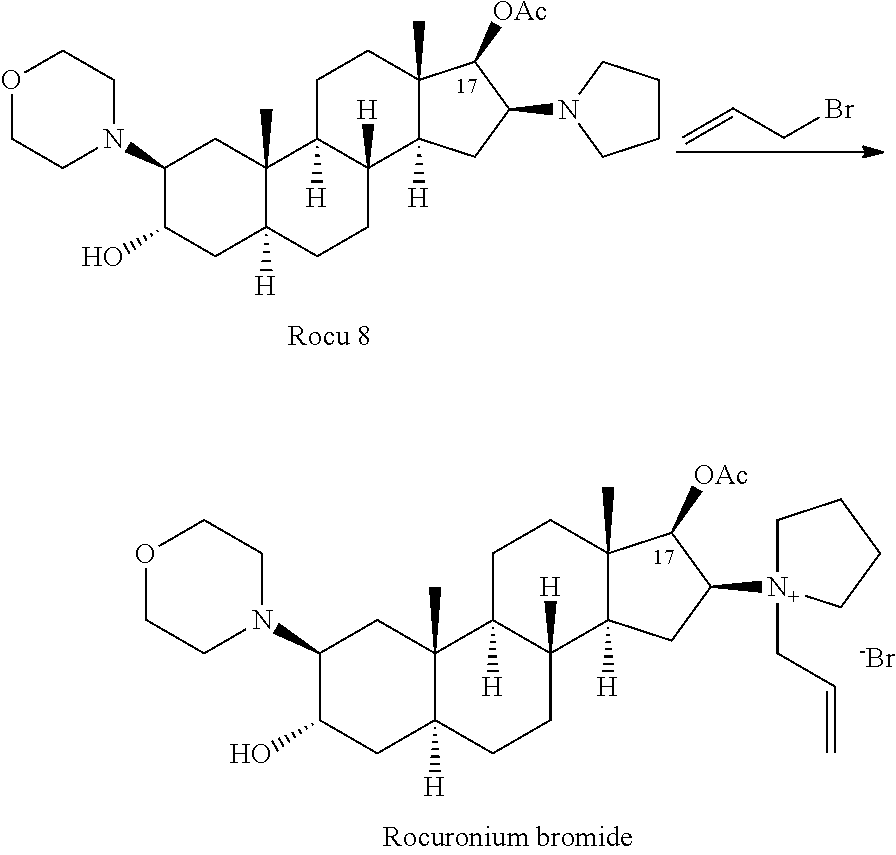Method for purifying rocuronium bromide
a technology of rocuronium bromide and purification method, which is applied in the field of medicine, can solve the problems of high cost, high cost, and inability to control the residue solvent in the product, and achieve the effect of high purity
- Summary
- Abstract
- Description
- Claims
- Application Information
AI Technical Summary
Benefits of technology
Problems solved by technology
Method used
Image
Examples
example 1
Purifying the Crude Rocuronium Bromide with the Method of the Present Invention
[0038]A crude rocuronium bromide was prepared with referrence to the method in EP0287150. Upon detection, the residual solvents in the crude product were: 3-bromopropylene 379 ppm, dichloromethane 3000 ppm, and diethyl ether 15%. HPLC purity of impurity A is 0.08%, and no impurity C was detected.
[0039]10.0 g the above crude rocuronium bromide was dissolved in 30.0 g of deionized water, and the solution was cooled to 5° C. Displacement with nitrogen gas and then distillation under reduced pressure were carried out. The distillation pressure was controlled to be about 20±5 mbar (positive pressure). After treatment for 3.5 hours, 0.4 g silica gel was added, and the mixture was kept at the temperature under stirring for 30 min. The mixture was filtered, and the filtrate was collected in a tray and then quickly freezed into ice at −40° C. The vacuum degree was controlled to 0˜5 Pa to carry out lyophilization. ...
example 2
Comparison of the Method of the Present Invention with a Conventional Purifying Method
[0041]Preparation of crude rocuronium bromide: 200.0 g 2β-(4-morpholinyl)-16β-(1-pyrrolidinyl)-5α-androstan-3α-ol, 17β-acetate and 140 ml 3-bromopropylene were added in a 1000 mL bottle under the protection of nitrogen gas at a constant temperature of 25° C. under mechanical stirring. The reaction was completed after 1.25 hours. 500 ml acetonitrile was added under stirring for dissolution. The solution was filtered by suction, and the filtrate was concentrated by rotary evaporation to dry. 800 ml dichloromethane was added for dissolution and the solution was slowly added dropwise into 48 L methyl tert-butyl ether under vigorous stirring. After completion of the addition, the mixture was stirred in an ice bath for 1 hour. The mixture was filtrated, and the filter cake collected was subjected to vacuum drying at room temperature for 2 days to yield 260.5 g crude rocuronium bromide.
[0042]The above cru...
example 3
Moisture and Stability Test Of The Crude Rocuronium Bromide
[0054]With respect to the stability of rocuronium bromide itself, the lower the residual moisture is, the more stable the product is. Upon investigation, the present inventors found that when the moisture in rocuronium bromide was 4% or more, a storage period of about 10 days at room temperature renders the hydrolyzed impurities being out of limits as stipulated in the USP33 standard and causes a large amount of unknown impurities to appear (see the data as shown in Table 2); when the moisture was controlled to about 0.5%, the levels of impurities were substantially unchanged after a storage period of one month at room temperature.
TABLE 2Storage stability at room temperature of rocuroniumbromide sample with a moisture of 4.5%Substances involved (HPLC)ImpurityImpuritySingle unknownTotalACimpurityimpuritiesDay 00.02%0.06%N.D0.08%Day 100.25%0.36%0.12%0.73%Day 200.30%0.40%0.20%0.90%Day 300.35%0.50%0.20%1.05%
TABLE 3Storage stabil...
PUM
 Login to View More
Login to View More Abstract
Description
Claims
Application Information
 Login to View More
Login to View More - R&D
- Intellectual Property
- Life Sciences
- Materials
- Tech Scout
- Unparalleled Data Quality
- Higher Quality Content
- 60% Fewer Hallucinations
Browse by: Latest US Patents, China's latest patents, Technical Efficacy Thesaurus, Application Domain, Technology Topic, Popular Technical Reports.
© 2025 PatSnap. All rights reserved.Legal|Privacy policy|Modern Slavery Act Transparency Statement|Sitemap|About US| Contact US: help@patsnap.com



